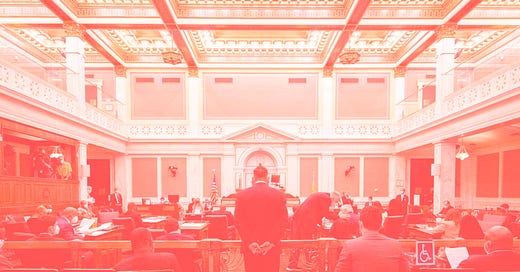Taking Lessons from Two Giants: Calm in the Face of Budget Crises is Possible
We don't yet have the benefit of hindsight as we do when looking back at past hardships,but maybe simply remembering that we’ve been here before can help quelch the hysteria about our fiscal situation
Recently I had the pleasure of traveling to nearby Philadelphia to attend the 80th birthday party of the former Governor of Pennsylvania, Mayor of Philadelphia, Democratic National Committee Chairman and District Attorney, the Hon. Ed Rendell. Quite a list of titles amounting to a storied giant in politics and government.
The energy and love in the room was palpable. While I sat at the event listening to dozens of former staffers and friends over many hours share their memories of who Ed Rendell was as a person, extolling his many successes in and outside of office, I was moved to remember a giant of New York and a personal friend, Dick Ravitch.
Many have beautifully reflected on Dick Ravitch’s amazing life and contributions to New York City and State, which serve as a reminder that there are lessons in the legacies and experiences of past leaders when we remember to look for them. Now, as temperatures reach a boiling point, it might be just that time.
The parallels between Ed and Dick are easy to see: two stalwarts in their states who picked up the mantle to serve the public whenever they could. More interestingly, the parallels between the situations these giants found themselves in then and the situations our leaders find themselves in now provide some reassurance that smoother days will come.
In the 1970s, Dick Ravitch was tasked with steering the city away from fiscal collapse, just as Ed Rendell was tasked with ending a prolonged fiscal crisis in Philadelphia in the 90s, a feat the New York Times described as “one of the most stunning turnarounds in recent urban history.” The situations in both cases were dire. In Philadelphia’s case, the city faced nearly a quarter billion dollars in debt and had literally run out of everything, from postage stamps for its letters to pants for its police recruits. Tensions were high, union contracts were due, crime was rampant, a bailout from the state or feds felt distant. Sound familiar?
Unbalanced budgets, fiscal cliffs, and even financial ruin are not unique threats. Steadfast leaders stared similar crises in the face and forged a hard come back plan, refusing to see them as the undoing that people at the time were warning them to be. We do not yet have the benefit of hindsight as we do when looking back at past hardships, but maybe simply remembering that we’ve been here before can help quelch the current hysteria about our fiscal situation.
The city’s current municipal budget has ballooned as city spending has increased by more than 50% over the past decade, yet we aren’t seeing 50% better delivery of government services. That’s why Mayor Adams is right to question whether or not taxpayers are getting value for their money and to reassess our spending. The biggest challenge, of course, is to find savings without sacrificing services. And on this, there is reason to be hopeful. According to a recent report by the Citizens Budget Commission, 80% of the city’s November 2023 Plan to Eliminate the Gap (PEG) savings will not affect services, but instead will result in increased efficiencies and shifting costs; the exact goal of a sensible budget overhaul in trying times.
Finding savings, tightening belts and yes — cutting spending — is not glamorous or politically expedient. It wasn’t in the 70s, 80s, or 90s when past leaders had to make these necessary decisions. As I sat at Ed Rendell’s birthday party decades after he left office, I heard a familiar lament as is often used in describing Dick Ravitch that, “they just don’t make politicians like that anymore.” Maybe that’s true, or maybe we just don’t see the wisdom in the hard choices our politicians have to make until their job is done.
Tannor is a political consultant at Tusk Strategies and co-founder of the 5BORO Institute.




